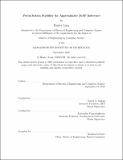| dc.contributor.advisor | David A. Sontag and Aravindan Vijayaraghavan. | en_US |
| dc.contributor.author | Lang, Hunter(Hunter J.) | en_US |
| dc.contributor.other | Massachusetts Institute of Technology. Department of Electrical Engineering and Computer Science. | en_US |
| dc.date.accessioned | 2019-07-15T20:29:11Z | |
| dc.date.available | 2019-07-15T20:29:11Z | |
| dc.date.copyright | 2018 | en_US |
| dc.date.issued | 2018 | en_US |
| dc.identifier.uri | https://hdl.handle.net/1721.1/121627 | |
| dc.description | This electronic version was submitted by the student author. The certified thesis is available in the Institute Archives and Special Collections. | en_US |
| dc.description | Thesis: M. Eng., Massachusetts Institute of Technology, Department of Electrical Engineering and Computer Science, 2018 | en_US |
| dc.description | Cataloged from student-submitted PDF version of thesis. | en_US |
| dc.description | Includes bibliographical references (pages 85-88). | en_US |
| dc.description.abstract | The MAP inference problem in discrete graphical models has found widespread applications in machine learning and statistical physics over the past few decades. However, for many useful model classes, this combinatorial optimization problem is NP-hard to solve efficiently. Approximation algorithms, which typically come with theoretical worst-case guarantees on their approximation ratios, are commonplace. On real-world data, however, these algorithms far outperform their worst-case guarantees, often returning solutions that are extremely close to optimal. This thesis asks, and partially answers, the question: "What structure is present in real-world data that makes MAP inference easy?" We propose stability conditions under which we prove that popular approximation algorithms work provably well, and we evaluate these conditions on real-world instances. | en_US |
| dc.description.statementofresponsibility | by Hunter Lang. | en_US |
| dc.format.extent | 88 pages | en_US |
| dc.language.iso | eng | en_US |
| dc.publisher | Massachusetts Institute of Technology | en_US |
| dc.rights | MIT theses are protected by copyright. They may be viewed, downloaded, or printed from this source but further reproduction or distribution in any format is prohibited without written permission. | en_US |
| dc.rights.uri | http://dspace.mit.edu/handle/1721.1/7582 | en_US |
| dc.subject | Electrical Engineering and Computer Science. | en_US |
| dc.title | Perturbation stability for approximate MAP inference | en_US |
| dc.title.alternative | Perturbation stability for approximate maximum a posteriori probability inference | en_US |
| dc.type | Thesis | en_US |
| dc.description.degree | M. Eng. | en_US |
| dc.contributor.department | Massachusetts Institute of Technology. Department of Electrical Engineering and Computer Science | en_US |
| dc.identifier.oclc | 1098173643 | en_US |
| dc.description.collection | M.Eng. Massachusetts Institute of Technology, Department of Electrical Engineering and Computer Science | en_US |
| dspace.imported | 2019-07-15T20:29:08Z | en_US |
| mit.thesis.degree | Master | en_US |
| mit.thesis.department | EECS | en_US |
